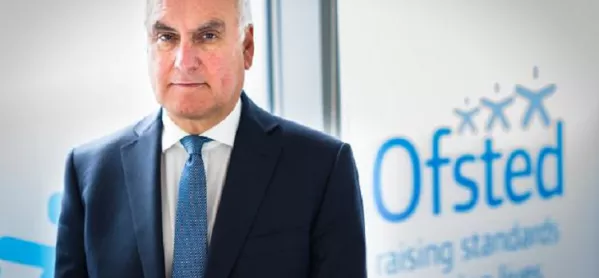Ofsted: Schools should not tolerate ‘scrappy worksheets’

Ofsted inspectors will be checking schools to ensure that pupils have access to textbooks and library books, rather than “scrappy worksheets”, under new plans unveiled by Sir Michael Wilshaw today.
Her Majesty’s chief inspector set out the biggest reforms to inspections in Ofsted’s 20-year history, ushering in shorter, more frequent visits for schools currently judged “good” by the watchdog. Among the changes will be the creation of a new “scrutiny committee” to “open up the complaints procedure to greater accountability”.
Speaking in central London this afternoon, Sir Michael said his inspectors would be looking out for a number of different factors when going into schools, such as whether they exhibited a general “no excuses” culture and offered a “challenging” environment for staff and students alike.
HMIs, he added, would also be asking if the school leaders were “people who tolerate scrappy worksheets” or if they insisted that their pupils had “good materials” to work with, including textbooks, for use in both class and for homework.
“I make this last point because HMI increasingly report to me, and I’ve seen it for myself, that too many schools, particularly secondary schools, have conceded defeat on this issue,” he said.
Sir Michael quoted one senior leader as saying that their school no longer allowed students to take books home with them “because they won’t bring them back”. “What on earth does that tell us about the culture in that particular institution?” he asked. “What on earth does it tell us about leaders who are not prepared to fight the good fight on this basic issue?”
And he added: “How on earth will we ever begin to address the shocking underachievement of bright youngsters from disadvantaged homes, if we carry on patronising the poor and serving them up with lower expectations?”
Sir Michael’s views appear to chime with those of schools minister Nick Gibb, who last week said that he had been working with teachers and publishers to increase the use of textbooks in schools.
“Good textbooks provide a structured, well-honed progression through a subject’s content,” he said.
Under further changes to Ofsted’s inspection regime, nurseries, schools and FE colleges previously judged “good” will from September be visited every three years to spot any signs of decline. At present, good schools are often visited only every five years, and every six years in the further education sector.
The changes will mean the creation of a new scrutiny committee that will be made up of HMIs, leading headteachers and early years and FE college leaders who are not involved in carrying out inspections for Ofsted. The group will assess and rule on the internal reviews of complaints about inspection.
The reforms will also mean all inspectors will be brought in-house, with seven out of 10 coming from good or outstanding schools. Lay inspectors with no experience of the classroom had been removed from inspection teams altogether, Sir Michael added.
Also from September, headteachers who have played a “key role” in turning around other institutions will be sent a letter informing them that their leadership has been acknowledged as being “exceptional”. The letter will also be sent to the education secretary.
Keep reading for just £1 per month
You've reached your limit of free articles this month. Subscribe for £1 per month for three months and get:
- Unlimited access to all Tes magazine content
- Exclusive subscriber-only stories
- Award-winning email newsletters



